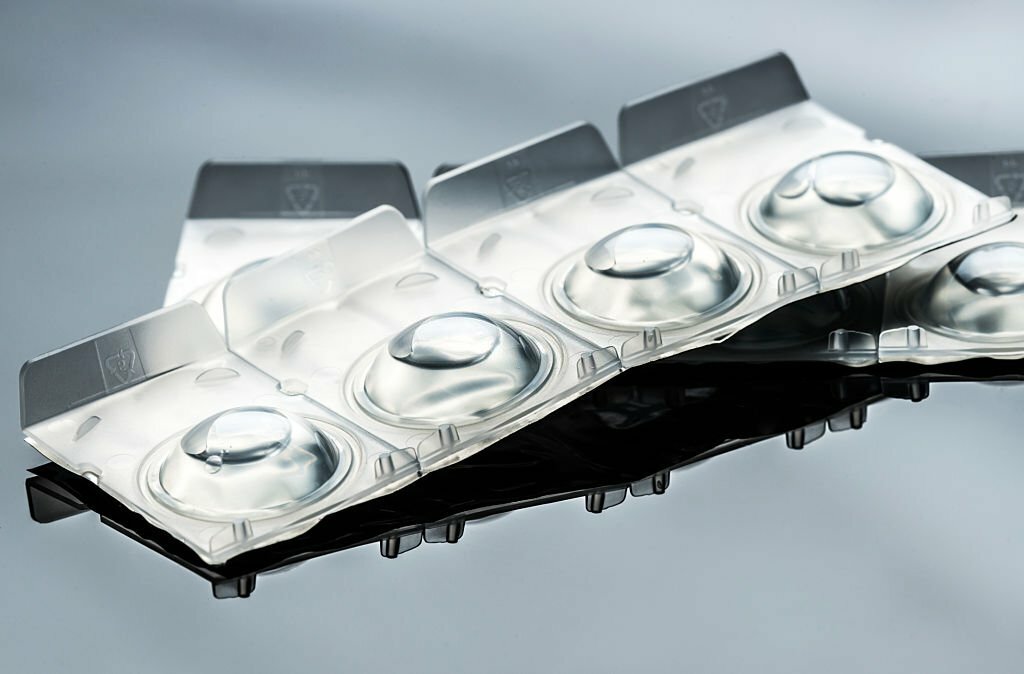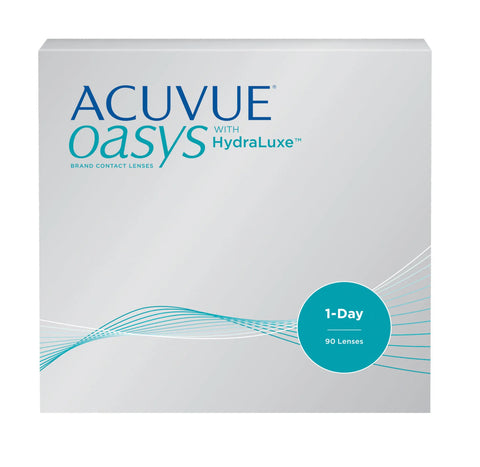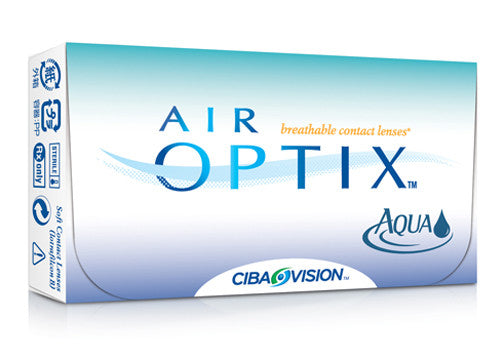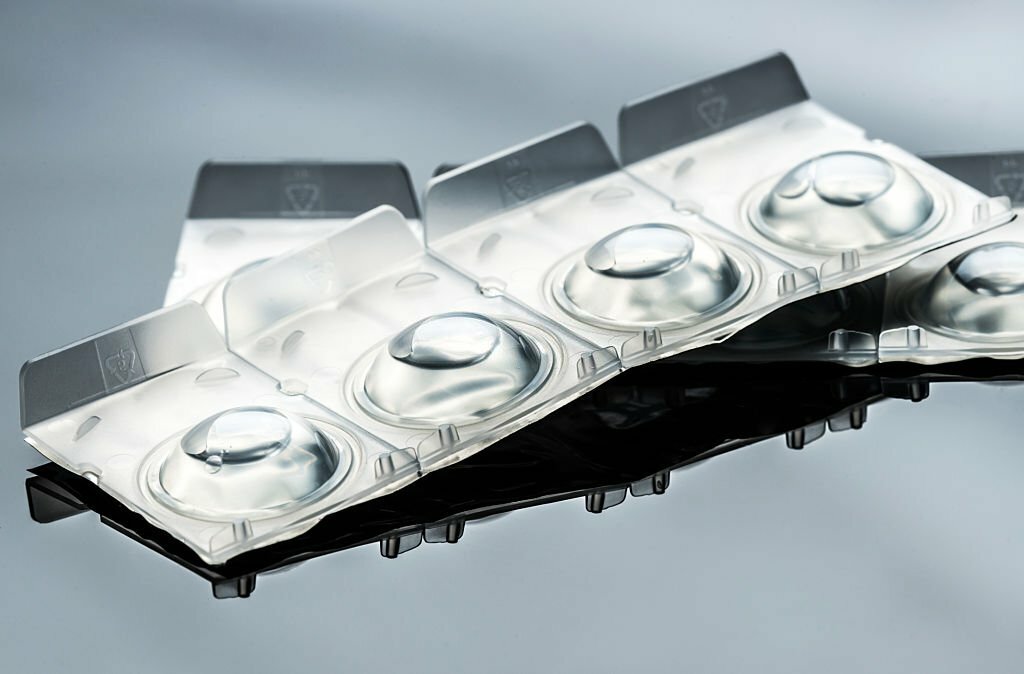
Contact lenses have become a popular choice for millions worldwide, thanks to their convenience, variety, and ever-evolving technology. But have you ever paused to consider what are contact lens made of?
From traditional hydrogel to advanced silicone hydrogel, and rigid gas permeable lenses, the materials chosen by manufacturers directly impact the oxygen permeability, moisture content, and overall comfort of your lenses.
Join us as we delve into the specifics of what makes each type of contact lens unique, providing a comprehensive look at these tiny yet transformative objects.
What this article covers:Types of Contact Lens Materials
The world of contact lenses is more diverse than one might think. With materials engineered to cater to various comfort levels, wearing schedules, and vision correction needs, whether you choose to wear daily contacts or a monthly contact lens, contact lenses come in all sorts and types.
Let's explore the common materials used in contact lenses.
Soft Contact Lens Materials
Soft contact lenses, renowned for their comfort and versatility, are predominantly made from hydrogel or silicone hydrogel materials.
These materials are designed to be pliable and gel-like, unlike their rigid gas permeable (RGP) counterparts, allowing for a snug fit that conforms well to the eyeball's surface. But what is each material, specifically and what benefits do they offer lens wearers?
Hydrogel Lenses
Introduced in the 1960s, hydrogel lenses brought about a significant shift in contact lens technology due to their remarkable comfort and high water content.
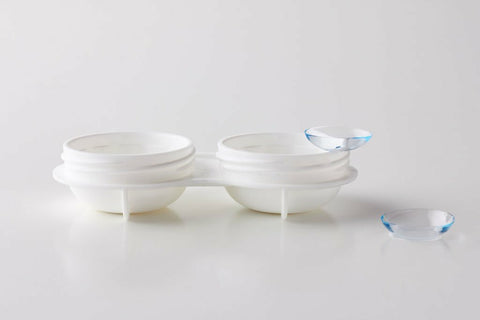
One of the main benefits of hydrogel lenses is their soft and gel-like consistency, providing a comfortable experience, particularly for first-time contact lens users who aren't used to the sensation of wearing contacts.
With a water content ranging between 38% to 75%, these lenses are made from hydrophilic polymers like enfilcon and hilafilcon B, materials renowned for their ability to mix well with water.
This refers to the lens material's “wettability”—higher wettability means that the tears spread more evenly across the surface of the lens, keeping it and the eye's surface moist.
Thanks to their high water composition, they're a suitable option for combating dry eyes, a common issue with generic contact lens wear.
For those interested in trying out hydrogel lenses, Acuvue 2 is a popular choice. These lenses are known for comfort and clarity, providing consistent moisture, especially beneficial for those prone to dry eyes.
If you've already tried them and are looking for another option, consider Soflens!
Silicone Hydrogel Lenses
Silicone hydrogel lenses, a groundbreaking development in contact lens history, initially available in the early 2000s, have transformed the contact lens industry with their innovative design and superior comfort.
These lenses are crafted from a unique type of soft material that significantly enhances oxygen delivery to the cornea, promoting better eye health and comfort for extended wear.
Our findings show that the incorporation of silicone, a material known for its exceptional flexibility and oxygen permeability, sets these lenses apart.
They utilize specific polymers that combine silicone with hydrogel, forming a hybrid material that optimizes oxygen flow while maintaining essential moisture for comfortable wear.
The standout benefit of silicone hydrogel lenses is their capacity for prolonged wear without discomfort, attributed to their high oxygen transmissibility. This feature caters to extended wear, allowing continuous use, both day and night, for certain periods, often up to a week.
Not only is it used in brands of multifocal contact lenses, but also in general correction lenses. At Fresh Lens, we provide a diverse selection; consider the Air Optix Night & Day Aqua, which utilizes SmartShield Technology, creating an ultra-thin protective layer to help shield your lenses from deposits.
Alternatively, the daily disposable contact lenses brand Dailies Total 1 employs water gradient technology, providing exceptional comfort by increasing water content from core to surface.
Rigid Gas Permeable Contact Lenses
Rigid Gas Permeable (RGP) contact lenses, also known as GP or hard contacts, have been a staple in vision correction since their introduction in the late 1970s. Unlike their soft counterparts, these lenses are made from a firm, durable material that retains its shape, providing sharp, clear vision.
Our research indicates that the materials used in RGP lenses are silicone-based polymers such as fluorosilicone acrylate, which allow oxygen to pass through the lens to the eye, ensuring eye health and comfort for extended wear.
One of the key benefits of RGP lenses is their ability to provide crisp vision for individuals with conditions like astigmatism or keratoconus.
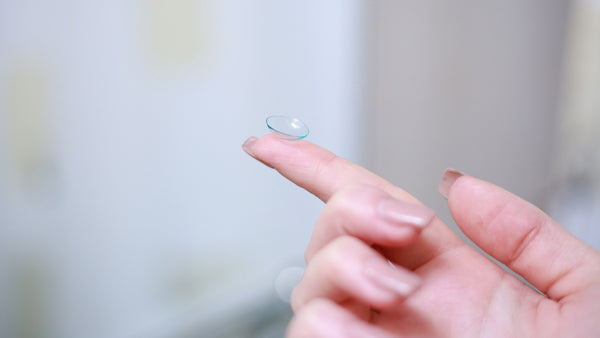
Not only are they durable and resistant to deposit buildup, with proper care, they can last for years.
Conclusion
Based on our observations, understanding lens materials is key as it directly impacts your eye health and comfort.
From the traditional hydrogel lenses known for their high water content and comfort to the advanced silicone hydrogel lenses, the materials used in contact lenses have evolved tremendously to meet the diverse needs of lens wearers.
Ready to transform your vision experience with a brand that understands your contact lens requirements? Visit Fresh Lens today and embark on a journey toward clearer, more comfortable vision.
If you want to learn more, why not check out these articles below:
- Contact Lens Powers
- What's a Toric Contact Lens
- When Were Contacts That Change Eye Color Invented
- Fun Facts About Contact Lenses
- Contact Prescription to Glasses
- How to Read Contact Prescription
- Can You Wear Colored Contacts Over Prescription Contacts
- Is Your Contact Prescription the Same as Your Glasses?
- Can You Wear Prescription Sunglasses with Contacts?
- Are Contact Lens Prescriptions Brand Specific?
- Best Contacts for Dry Eyes
- Can Dry Eyes Cause Blurry Vision with Contacts?
- Are Daily Contacts Better for Dry Eyes?
- Colored Contacts for Dry Eyes
- All-Around Best Contact Lenses













